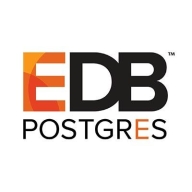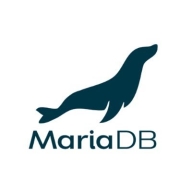

MariaDB and EDB Postgres Advanced Server are prominent players in the database solutions category. EDB Postgres Advanced Server is notably considered superior due to its more comprehensive feature set, despite the higher cost.
Features: MariaDB offers reliability, enterprise integration, and strong documentation. Its Connect Engine and ColumnStore enhance analytics, while its scalability and open-source model provide accessibility. EDB Postgres Advanced Server provides high availability, performance, and Oracle compatibility, featuring JSONB and vector database management to support complex deployments.
Room for Improvement: MariaDB needs enhancements in enterprise integration, complex SQL query support, scalability, and BI tool integration. EDB Postgres Advanced Server could benefit from improved JSONB query and indexing support, stronger security, and better performance in large-scale operations.
Ease of Deployment and Customer Service: MariaDB offers on-premises, public, and hybrid cloud options, supported by a vibrant community, though technical support may be limited. EDB Postgres Advanced Server focuses on hybrid and public cloud deployments with improved support and troubleshooting.
Pricing and ROI: MariaDB is celebrated for its cost-effectiveness with minimal licensing fees. EDB Postgres Advanced Server, being open-source, provides additional licensing options and significant cost savings over Oracle, enhancing their ROI appeal.
| Product | Market Share (%) |
|---|---|
| MariaDB | 6.5% |
| EDB Postgres Advanced Server | 2.0% |
| Other | 91.5% |

| Company Size | Count |
|---|---|
| Small Business | 2 |
| Midsize Enterprise | 1 |
| Large Enterprise | 8 |
| Company Size | Count |
|---|---|
| Small Business | 27 |
| Midsize Enterprise | 12 |
| Large Enterprise | 25 |
EDB Postgres Advanced Server is a powerful and reliable database management system designed for production workloads. It offers a range of advanced features, making it an ideal choice for businesses looking to scale their operations. With support for multi-tenancy, JSONB, and production features similar to Oracle, the solution is versatile and can meet the needs of a wide range of organizations.
Overall, EDB Postgres Advanced Server is a robust and flexible database management system that can help businesses achieve their goals and stay competitive in today's fast-paced digital landscape.
MariaDB is an open source relational database created by the original founders of MySQL. It is considered one of the most popular and trusted database servers throughout the world. MariaDB is a valued component found in most cloud offerings and is the default in many Linux tools. It is also widely used by Wikipedia, WordPress, and Google, among other well-known sites. Maria DB easily melds data into concise information from a vast array of applications, such as banking, online shopping, websites, and more.
MariaDB was originally created to improve MySQL performance. It is the most widely chosen database server due to the solution being super fast, robust, user-friendly, and easily scalable. MariaDB also offers a substantial ecosystem of plugins, storage engines, and numerous other valuable tools that make it very attractive for a significant offering of use cases.
The solution’s newest functionalities include compatibility with Oracle Database and Temporal Data Tables, and advanced clustering with Galera Cluster 4, which make it easier for users to research data history from any point in the past. Additionally, the most recent versions include JSON and GIS features. MariaDB is committed to staying an open source solution.
MariaDB Features
Reviews from Real Users
Faustine C., Engineering Supervisor- Corporate Data Solutions and Services at TZ Telecoms Corporation, shares, “The software provides a lot of information on what is happening inside the database. For most performance parameters it is easy to know if something is not right in the configuration or optimization which helps engineers take remedial fine-tuning measures. For example, if the database is underperforming it is easy to know which performance parameter can be adjusted to handle the workload. It is difficult to troubleshoot database issues if many performance parameters can not be monitored or debugged which is the case with some database management systems. It provides great monitoring of data storage, processing, and performance stability which is really important for real-time data storage and processing. It's a user-friendly product.”
A PeerSpot user who is a Senior Engineer at a tech services company relates, “ The solution's high availability is its most valuable aspect. We have found the product to be stable and the initial setup is pretty simple. I'd rate the solution at a ten out of ten. I'm very happy with it overall. I would recommend the solution to others. It's easy to find details about the product online and to learn about it.”
We monitor all Open Source Databases reviews to prevent fraudulent reviews and keep review quality high. We do not post reviews by company employees or direct competitors. We validate each review for authenticity via cross-reference with LinkedIn, and personal follow-up with the reviewer when necessary.